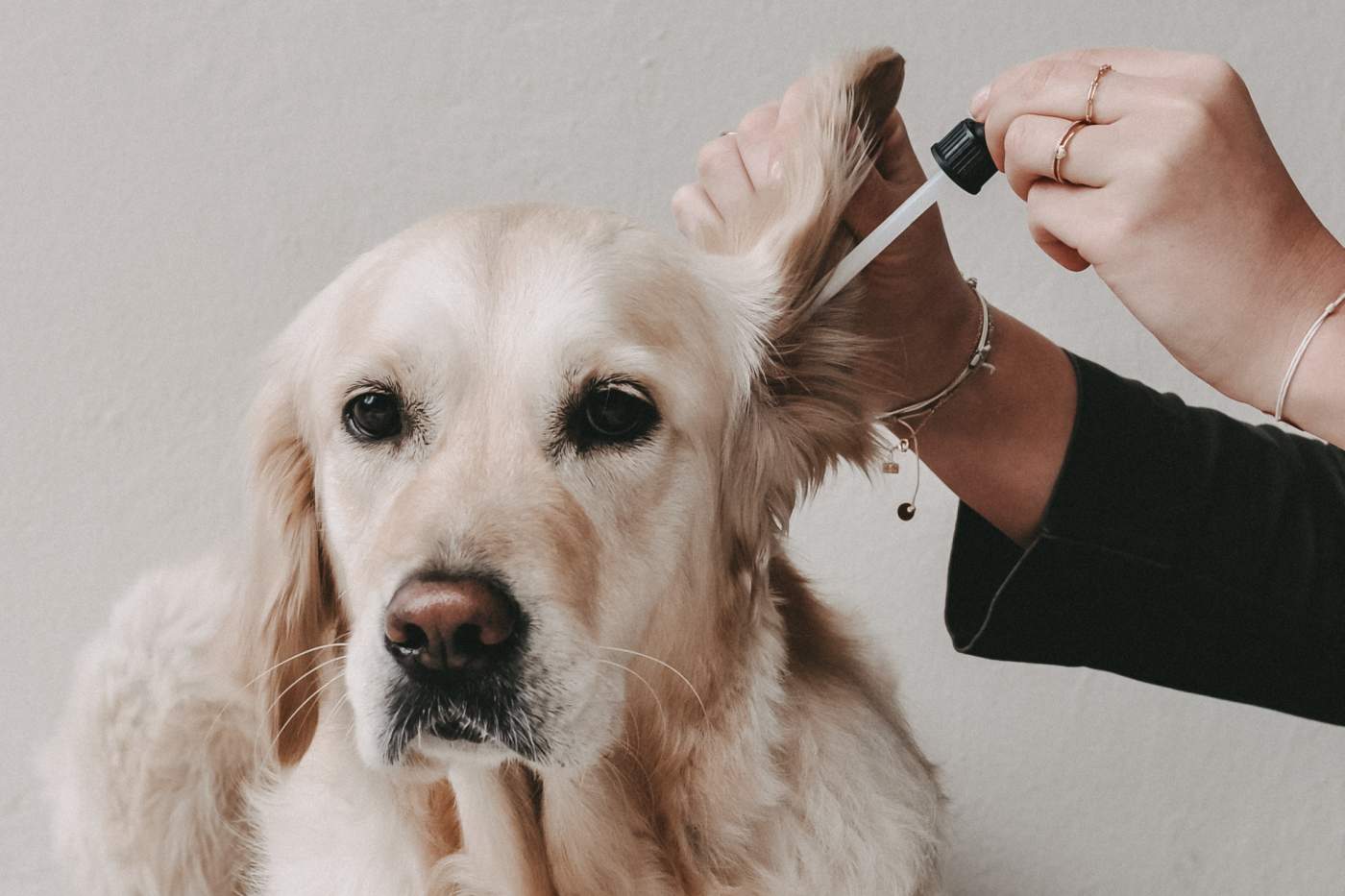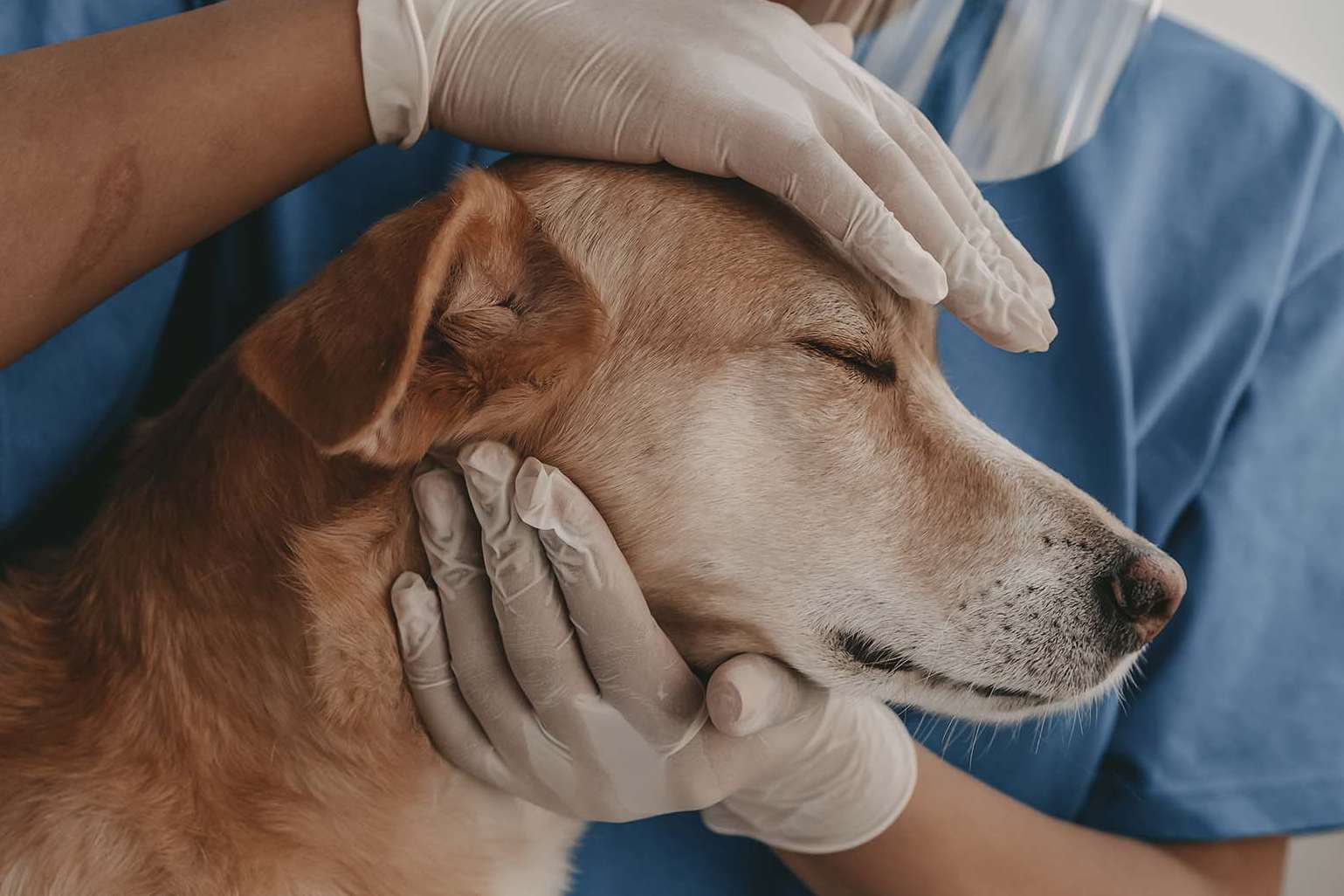
Allergies in dogs: When the immune system goes crazy
Allergies are – on closer inspection – actually quite strange. Dogs, like humans, have a highly developed immune system that is able to distinguish between
Shop / Concerns / Head shaking
Head shaking in dogs can be a symptom of various ear problems, such as inflammation due to infection or allergic reactions. Foreign bodies in the ear canal can also be responsible. It is important to take these signs seriously and treat the dog’s ears appropriately to prevent inflammation.


Ear problems in dogs are not uncommon and can have various causes. It is important to find the cause and to care for the ears regularly to make them more resistant.
On this page I have compiled for you how you can correctly identify ear problems and their causes and best help your four-legged friend with appropriate care and prevention.

Dr. Stefanie Mallmann, veterinarian at LILA LOVES IT
If your four-legged friend has problems with his ears, this is usually manifested by increased head shaking, unpleasant odour from the ears, increased production of earwax, tilting of the head or pain when eating or touching the ears. If your dog has persistent problems with his ears, you should always have him examined by a veterinarian.

With regular care and targeted treatment of the cause, you can help your four-legged friend keep healthy ears. This includes thorough cleaning with an effective ear cleaner.
Our LILA LOVES IT ear cleaner with microsilver has been specially developed for cleaning dogs’ ears and is suitable both for preventing ear problems and for treating acute inflammations. Regular use can help make ears more resistant, less prone to inflammation or reduce existing inflammation.

Typical signs of ear problems in dogs are increased head shaking, scratching of the ears, unpleasant odour coming from the ears, tilting of the head, pain when touching the ears or eating, redness or swelling around the ears, increased earwax or even reduced hearing. It is important to take these signs seriously and examine your dog's ears carefully to determine if it is an infection, inflammation or a foreign body in the ear canal. If these symptoms occur, be sure to consult a veterinarian to determine the cause and initiate the necessary treatment. Regular care of the ears and targeted prevention can help your dog keep healthy ears. The treatment of an ear infection in your dog depends on the cause and severity of the infection. A veterinarian will usually perform a thorough examination of the ear and, if necessary, take a swab to identify the pathogen. Treatment can usually involve a combination of medication, ear cleaning and a change in diet. Antibiotics and anti-inflammatory medications may be prescribed to fight the infection and relieve pain. Regular cleaning of the ears can also help prevent further bacteria from growing in the ear and aid healing. A change in diet can also help to strengthen your dog's immune system and prevent inflammation. It is important to follow the vet's instructions carefully and have regular follow-ups to ensure that the ear infection is completely healed. To clean your dog's ears properly, you should use a suitable ear cleaner. Put the cleaner directly into the ear so that the outer ear canal is filled, massage it into the ear and let the dog shake it out on its own. Afterwards, the outer ear can be carefully cleaned of any remaining dirt with a cloth or cotton wool - the ear care set from LILA LOVES IT is particularly suitable for this. The ears should only be cleaned when they are really dirty or according to the vet's instructions. Too frequent cleaning can destroy the natural protective barrier in the ear and lead to an ear infection. The frequency of ear cleaning depends on various factors, such as age, breed, the dog's activities and the anatomical shape of the ear. However, as a general rule, our vet recommends cleaning your dog's ears once or twice a week to prevent the build-up of earwax and bacteria. However, it is important not to clean too often as this can upset the natural balance of the ear and lead to further problems. However, if your dog is prone to ear infections, consult your vet who can give an individual recommendation on care and cleaning frequency for your dog. Yes, it is important to take your dog to the vet if he shows symptoms of ear problems, such as shaking his head, scratching his ears or an unpleasant smell coming from his ears. The vet can make an accurate diagnosis and recommend the appropriate treatment to prevent further complications. If you leave your dog's ear problems untreated, infections can worsen and lead to serious health problems. Therefore, it is important to visit the vet early and follow the vet's recommendations for the treatment and prevention of ear problems in dogs. Getting your dog used to cleaning his ears should be gradual and based on positive reinforcement. Start by getting your dog used to touching his ears with his hands and cotton pad, rewarding him every step of the way. Then you can show him how the ear cleaner feels by first putting a few drops on a cotton or cotton pad and gently cleaning the ears. Work your way through the cleaning process described in the ear cleaner package insert step by step, rewarding your dog at each intermediate step to give him positive reinforcement. It is important not to overwhelm or frighten your dog. If your dog already has acute ear problems, it is advisable to visit a vet first and have the ears professionally cleaned to avoid pain and discomfort. Yes, it is possible that your dog is allergic to the ingredients of an ear cleaner. If your dog is allergic to certain ingredients, it can cause skin irritation, itching or even breathing problems. If you suspect that your dog is allergic to the ear cleaner you are using, you should stop using it immediately and consult a vet. The vet can recommend an appropriate treatment for your dog and also recommend alternative products that are suitable for your dog. It is also important to always check the ingredients before using a new ear cleaner and make sure that it does not contain any ingredients that your dog is otherwise allergic to. Regular ear care is important to prevent ear problems. Clean your dog's ears once a week to remove excess wax and dirt. Only use products specifically designed for dogs such as the LILA LOVES IT Ear Cleaner with cotton wool or cotton pads such as the LILA LOVES IT Cleanies - do not use cotton buds. Keep the fur around the ears trimmed short to allow good air circulation and avoid accumulation of moisture. Avoid letting water into the ears when your dog is bathing or swimming by putting cotton wools in his ears while he does so. Make sure your dog does not get foreign objects in his ears and avoid shaking his head too often. Independent head shaking could indicate an ear problem. Allergies are – on closer inspection – actually quite strange. Dogs, like humans, have a highly developed immune system that is able to distinguish between If a dog has an earache, it is in agony. Regular control, cleaning and treatment of the dog’s ears are therefore one of the most How do you treat an ear infection in dogs?
How do I clean my dog’s ears properly?
How often should I clean my dog’s ears?
Do I have to take my dog to the vet if he has ear problems?
How can I get my dog used to cleaning his ears?
Can my dog be allergic to the ear cleaner?
How do I prevent ear problems in my dog?
More on the topic of «head shaking in dogs» (in german)
Allergies in dogs: When the immune system goes crazy
Gentle ear cleaning for dogs
Other concerns that might interest you
All Rights reserved © 2023 FINIDORE Manufaktur GmbH